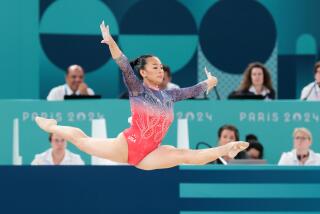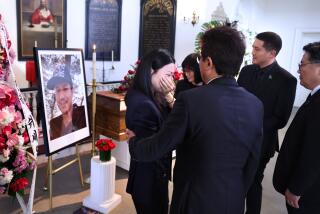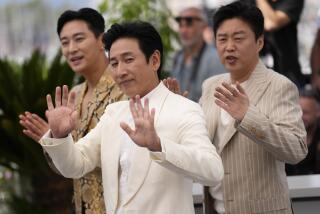A sister’s death gives her brother a future
MELVILLE, N.Y. — Sunyun Lee’s greatest gift to her brother came after her death.
Three days after she died unexpectedly from an aneurysm on Jan. 18, a team at a Long Island hospital transplanted both her kidneys into her brother. Now Seung Hoon Lee has a chance at a normal life, doctors said.
At a news conference later, a tearful Seung Hoon Lee spoke of his sister through a Korean interpreter. He said that he could feel her spirit within him and that he would “be very careful” to protect it.
For the families involved, the dramatic events somehow make emotional sense: Sunyun Lee, a 46-year-old mother of two, was her brother’s greatest support after he was diagnosed with a fatal kidney disease in November.
She encouraged her brother, 38, to go on dialysis while he went on the transplant waiting list. She was at his side on his many visits to North Shore University Hospital in Manhasset.
Dr. Peter Walker, medical director of the hospital, said that with more than 5,000 on the kidney-transplant list in the New York area, Seung Hoon Lee might have otherwise needed to wait seven years or more to get a kidney. Nationwide, about 100,000 people are on the kidney-transplant list. Each year, about 6,000 die waiting.
But Seung Hoon Lee’s wait was shorter because his donor was his sister. Soon after Sunyun Lee was declared dead, a representative from the New York Organ Network, the federally designated organ procurement organization for the metropolitan area, came to the hospital to ask the family whether it was interested in making a donation. They agreed, then quickly realized her brother could be the recipient.
The doctors tested the kidneys to make sure Seung Hoon Lee’s immune system would not reject them. Transplanted kidneys are more likely to be compatible if they come from the same ethnic group. Although she had type B blood and he had type AB, the brother and sister otherwise matched perfectly -- a rarity, according to the hospital.
A team headed by Dr. Ernesto P. Molmenti, director of transplantation at North Shore, spent a frantic weekend giving Seung Hoon Lee the battery of tests to ensure he was healthy enough to withstand the transplant.
Usually only one kidney is transplanted into a patient, but Molmenti said the decision was made to transplant both into Lee, in part because it was the family’s wish and in part because doctors were concerned that both of Sunyun’s kidneys showed slight abnormal function.
“We wanted to give him the best advantage possible,” Molmenti said. Sunyun Lee’s other organs were not able to be transplanted, he said.
Molmenti said that 72 hours after the operation, Lee was able to attend his sister’s funeral. He has “greater life expectancy” and, now that he is free of dialysis, “a greater quality of life,” Molmenti said.
Myung Cho, a nurse manager in the dialysis unit who was Lee’s interpreter at the news conference, said she very much remembered his sister.
“She was a beautiful lady,” she said. “He looked so sick, and she was so concerned.”
Sunyun Lee’s son Christopher, 14, said his mother was always “caring for everyone but too busy to care for herself.”
Her loss, he said, has made the family closer. “I think of her as a hero,” he said.
More to Read
Sign up for Essential California
The most important California stories and recommendations in your inbox every morning.
You may occasionally receive promotional content from the Los Angeles Times.










